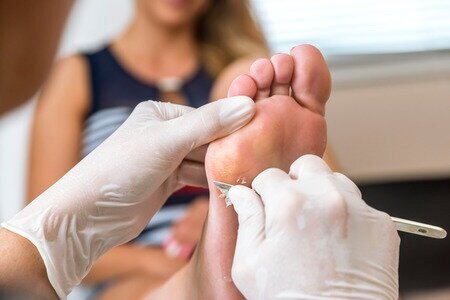Preventing and Treating Calluses and Corns
Anyone – men, women, and kids of any age – can develop a callus or a corn on their foot. These skin abnormalities are among the most common reasons that patients visit Middlesex County podiatrists Dr. Jason Grossman and Dr. Paul A. Osemene. Once you know what calluses and corns are and you understand how they are caused, it’s easy to take some steps to prevent their occurrence.
Calluses and corns share numerous similarities, most particularly that they are both areas of hardened skin. A callus is a patch of hard, thick skin and is the result of repeated pressure in the same area. Think of a guitar player’s fingertips, for example. On the feet, calluses tend to appear on weight-bearing areas such as the heels and often follow a blister. This is one reason why runners are particularly vulnerable. A corn develops on non-weightbearing areas of the feet, most often on the toes. Be alert to an area of inflamed skin with a hard center.
Because corns and calluses are so inextricably linked to pressure and friction, the best way to prevent them is with careful shoe choices. Opt for everyday shoes that offer enough room in the toe box to prevent toes from rubbing against one another. Be sure that the heel area is cushioned and well-supported. If you exercise outside by walking, running, or hiking often, keep sneakers in good condition and replace them every six months or 500 miles, whichever comes first.
If you develop a callus or corn, do not attempt to remove it at home. Because the affected skin is made of many layers, this is a job for a professional. Do-it-yourself treatments often involve dangerous chemicals or blades and can cause more harm and result in infection.
If you suspect that you have developed a callus or corn, or if you have another concern about the health and wellness of your feet, call (732) 679-4330 or click here to communicate with the friendly Advanced Feet and Ankle Care staff. We’ll be happy to schedule an appointment for you to see podiatrists Jason Grossman, DPM and Paul A. Osemene, DPM in our modern, comfortable Old Bridge or Sayreville offices. Our doctors will conduct a thorough examination of your feet, ankles, and lower legs, then arrive at an accurate and specific diagnosis, and work with you to create an effective and individualized plan for treatment and any necessary ongoing care.

